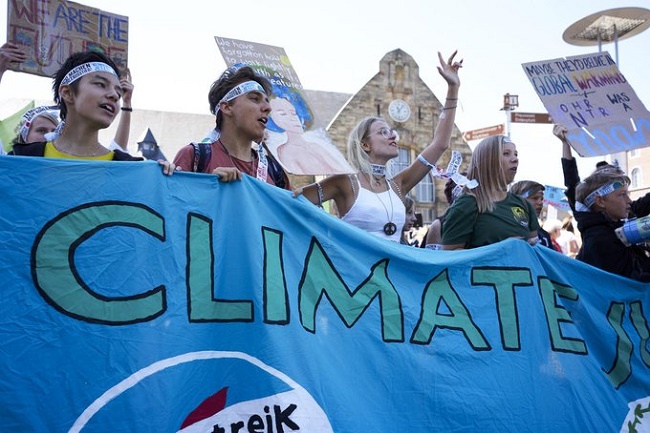In the lead-up to COP27, the 27th UN climate summit, in Egypt, about 400 young climate mobilisers and organisers from across the Global South are gathering at a Climate Justice Camp in Tunisia to co-create strategies and demand an equitable and just response to the climate crisis.

Led by climate groups across Africa and the Middle East in Tunisia, the week-long Climate Justice Camp that commenced on Monday, September 26, 2022, hosts those living in some of the world’s most affected regions as they come together to build bridges of solidarity across movements in the Global South, collectively strategise to increase global awareness of the need for systemic change, and prioritise an intersectional transition that puts the wellbeing of people and planet before the profits of corporations.
Ahmed El Droubi, Regional Campaigns Manager, Greenpeace Middle East & North Africa, said: “The least responsible nations and communities are suffering the most from the impacts of the climate emergency, which is further deepening historical injustices. In November, world leaders will be making decisions in Egypt, which will affect the future of our communities. We in the Global South need to be at the front of this process to apply pressure for real climate action rather than it being another photo opportunity producing empty words and pledges.
“The Climate Justice Camp gives young people from around the world a platform to create connections between climate movements in the Global South, so that we can build essential intersectional capacity to challenge the prevailing narratives of politicians and multinational corporations that seek to preserve the current power structure.”
Tasnim Tayari, I Watch Head of Citizen Engagement, said: “For many Global South communities, access to things like the internet, transportation, and funding which enables groups in other parts of the world to organise as a movement is often limited. The Climate Justice Camp gives us mass access to a space where we can work together to build a climate conversation centred on the Global South, and continue to remain connected.
“For environmental organisers here in Tunisia and North Africa, the international networks created during the camp will give us invaluable opportunities to share and learn about approaches to climate campaigning in different contexts. These reflections will be taken back to our communities, fostering broader public engagement on environmental issues.
“We are all at risk and must come together, from civil society and grassroots movements, to religious institutions and decision-makers, to bring about meaningful political and systemic change for us and future generations that is developed through the lens of justice and equity.”
Almost 400 youth climate representatives are attending the Climate Justice Camp, from regions including Africa, Latin America, Asia, and the Pacific. Dozens of climate groups including I Watch, Youth For Climate Tunisia, Earth Hour Tunisia, Climate Action Network (CAN), Powershift Africa, African Youth Commission, Houloul, AVEC, Roots, Greenpeace MENA, 350.org, and Amnesty International have been collaborating to bring the camp together.
With a focus on young people as change-makers, mobilisers at the camp will create networks of connection, engage in skill sharing and workshops, and build up a Global South grassroots agenda that adds mounting pressure for leaders involved in COP27 and beyond to prioritise the urgent needs of communities on the frontlines of the climate crisis.
